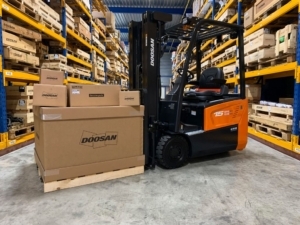Four Benefits of Lithium-ion Forklift Trucks
Forklifts are an essential tool for businesses. They can streamline the heavy lifting and the movement of goods within logistics, manufacturing and warehousing. Many sectors rely heavily on them in their day-to-day operation. With a future that is looking ever more at sustainable solutions, how is the forklift industry keeping up? One of the most popular ways is through the adoption of lithium-ion forklift trucks.
This relatively new battery technology has brought a new generation of forklifts which offer a wide range of benefits and improvements over the traditional lead acid battery and even diesel and LPG forklift trucks. So what are the differences between lithium-ion and lead acid battery forklift trucks and how does the technology differ?
The Different Technology

The very first commercial lithium-ion battery was used in 1991, however, when it comes to forklifts lithium-ion batteries have only been around for around 12 years. In comparison to this lead acid is the old tried and tested system, dating back to the early 1920s. Whilst they are much older in design and technology, lead acid batteries have had some major updates over the years and are still a very sound option for certain applications, as you’ll see below.
Lead-Acid forklift batteries are rechargeable batteries that have a high power-to-weight ratio and are sought after due to their lower cost. They are known as motive batteries. One of the benefits of the lead-acid battery is its weight! When lifting heavy objects they need something to help balance the weight. In this case, a lead acid battery acts as an inbuilt counterbalance and keeps the forklift from tipping over when lifting heavy loads.
In comparison to these, lithium-Ion forklift batteries are rechargeable lithium and graphite batteries with a very high energy density, low discharge rate and no memory loss. While lithium is a much lighter material, these batteries still weigh between 250 and 1,250 kg. This lighter battery technology means less weight than your forklift is carrying, so sometimes you’ll even see a metal plate or additional ballast to help provide additional weight to keep the forklift from tilting when carrying heavy loads.
There are some pros and cons to each of these battery types, however, we’ll look at four significant benefits to why you should look at lithium-ion next time you need a forklift.
Increased Productivity
The maintenance is zero. Lithium-ion batteries could save you hundreds, maybe even thousands of pounds because they do not require the most expensive maintenance element ………topping up and the labour to carry out this task which increases productivity and gives more run time per shift.
Naturally, both batteries need regular checks in terms of wear to plugs & cables, monitoring the charger for faults and making sure the battery and charger software is up to date.
At Dawsongroup material handling, we are pleased to be able to offer a wide range of lithium-ion and lead acid battery electric forklift trucks to suit our customer’s exact requirements. It’s great to see how these new technologies add value for our customers which ensures that we can continue to offer real tangible improvements and innovations for the long-term efficiency, productivity and reliability of their operations for many years to come.
Find out more about the lower total cost of ownership, energy usage, and suitability.
Contact Dawsongroup material handling to find out how our Smarter Asset Strategy can provide your business with the solutions you need.
If you are looking for material handling solutions for your company, request a free consultation with a Dawsongroup expert by completing the contact form below.
UK Head office
Delaware Drive
Tongwell
Milton Keynes
MK15 8JH

Dawsongroup Limited | Company reg. no. 01902154 (registered in England and Wales)